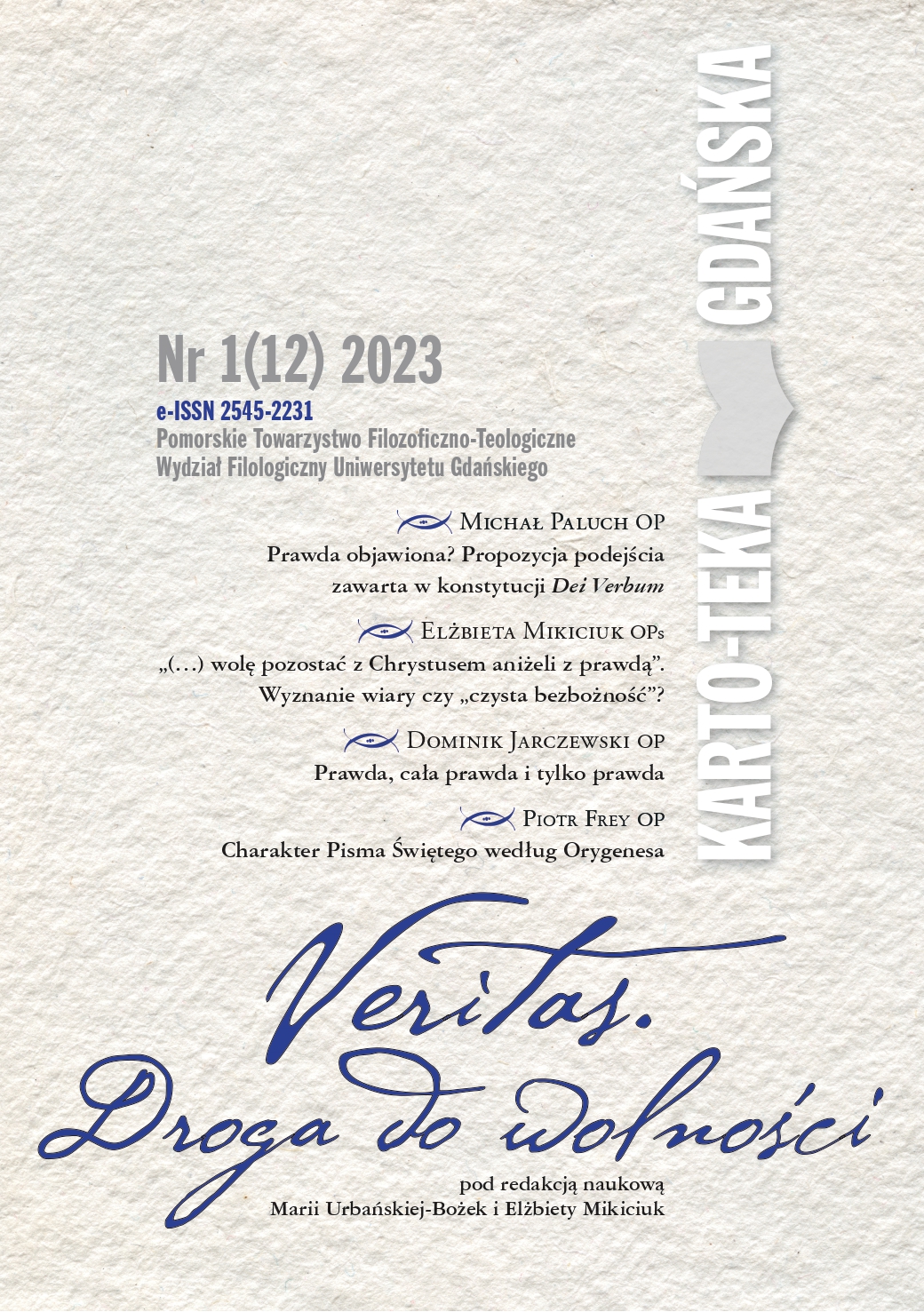Truth, the whole truth, and nothing but the truth. What are we looking for when seeking knowledge?
DOI:
https://doi.org/10.26881/kg.2023.1.03Keywords:
value of knowledge, truth, epistemic goods, Meno Problem, nonfactivism, social epistemologyAbstract
The aim of the paper is to argue that truth is the ultimate goal of knowledge. First, two intuitions are examined which, it is argued, are key in arguing for the inadequacy of truth as an end of cognition. Then, they are addressed by showing, on the one hand, that the problem of the value of knowledge cannot be reduced to its nature and, on the other hand, by arguing that it is possible to reconcile the sufficiency of truth as an end of knowledge with the value of justification in knowledge using the distinction between admirable and desirable goods. It is further shown that the perspective of social epistemology makes it possible to strengthen the role of justification while maintaining the strong thesis of the self-sufficient value of truth for knowledge. Finally, responses are offered to Kelp’s and Elgin’s recent counter-arguments concerning the end of inquiry and the value of falsehoods in knowledge, respectively.
Downloads
References
Alston W., Concepts of Epistemic Justification, „Monist” 1985, t. 68, nr 1, s. 57–89.
———, Beyond „Justification” : Dimensions of Epistemic Evaluation, Cornell University Press, Ithaca 2005.
Ballantyne N., Knowing our Limits, Oxford University Press, New York 2019.
Boylu A., How Understanding Makes Knowledge Valuable, „Canadian Journal of Philosophy” 2010, t. 40, nr 4, s. 591–609.
Craig E., Knowledge and the State of Nature : An Essay in Conceptual Synthesis, Oxford University Press, Oxford 1990.
Elgin C., True Enough, „Philosophical Issues” 2004, t. 14, nr 1, s. 113–131.
Gettier E., Is Justified True Belief Knowledge ? „Analysis” 1963, t. 23, nr 6, s. 121–123.
Goldman A., The Unity of the Epistemic Virtues, w : Virtue Epistemology : Essays on Epistemic Virtue and Responsibility, red. A. Fairweather i L. Zagzebski, Oxford University Press, New York 2001, s. 30–48.
Grimm S., Is Understanding A Species Of Knowledge ? „The British Journal for the Philosophy of Science” 2006, t. 57, nr 3, s. 515–535.
———, Understanding and Transparency, w : Explaining Understanding: New Perspectives From Epistemology and Philosophy of Science, red. S. Grimm, C. Baumberger i S. Ammon, Routledge, New York 2016, s. 212–229.
Hannon M., What’s the Point of Knowledge ? A Function-First Epistemology, Oxford University Press, Oxford 2019.
———, Recent Work in the Epistemology of Understanding, „American Philosophical Quarterly” 2021, t. 58, nr 3, s. 269–290.
James W., Prawo do wiary, tłum. A. Grobler, Wydawnictwo Znak, Kraków 1996.
Kelp C., Towards a Knowledge-Based Account of Understanding, w : Explaining Understanding: New Perspectives from Epistemology and Philosophy of Science, red. S. Grimm, C. Baumberger i S. Ammon, Routledge, New York 2017, s. 251–271.
———, Inquiry, Knowledge, and Understanding, Oxford University Press, Oxford 2021.
———, Theory of Inquiry, „Philosophy and Phenomenological Research” 2021, t. 103, nr 2, s. 359–384.
Kvanvig J., The Value of Knowledge and the Pursuit of Understanding, Cambridge University Press, Cambridge 2003.
Kyriacou C., Ought to Believe, Evidential Understanding and the Pursuit of Wisdom, w : Epistemic Reasons, Norms and Goals, red. M. Grajner i P. Schmechtig, De Gruyter, Berlin 2016, s. 383–406.
Lewis C.I., On Two Types of Judgment (notatka z 1.03.1937), s. 4, Archiwa C.I. Lewisa, Pudło 14, Teczka 17, Uniwersytet Stanforda.
Platon, Gorgiasz; Menon, tłum. W. Witwicki, Antyk, Kęty 2002.
Pritchard D., Epistemic Luck, Clarendon Press, Oxford 2007.
———, Epistemic Axiology, w : Epistemic Reasons, Norms and Goals, red. M. Grajner i P. Schmechtig, De Gruyter, Berlin 2016, s. 407–422.
Singer D., How to Be an Epistemic Consequentialist, „The Philosophical Quarterly” 2018, t. 68, nr 272, s. 580–602.
Williams B., Problems of the Self : Philosophical Papers, 1956-1972, Cambridge University Press, Cambridge 1973.
Williamson T., Knowledge and its Limits, Oxford University Press, Oxford 2000.
Zagzebski L., The Inescapability of Gettier Problems, „The Philosophical Quarterly” 1994, t. 44, nr 174, s. 65–73.
———, Virtues of the Mind : An Inquiry into the Nature of Virtue and the Ethical Foundations of Knowledge, Cambridge University Press, New York 1996.
———, The Search for the Source of Epistemic Good, „Metaphilosophy” 2003, t. 34, nr 1/2, s. 12–28.
———, Recovering Understanding, w : Virtue Epistemology. Contemporary Readings, red. J. Greco i J. Turri, MIT Press, Cambridge 2012, s. 351–373.
———, From Reliabilism to Virtue Epistemology, w : Epistemic Values, Oxford University Press, Oxford 2020, s. 141–151.

 Academic Scientific Journals
Academic Scientific Journals

